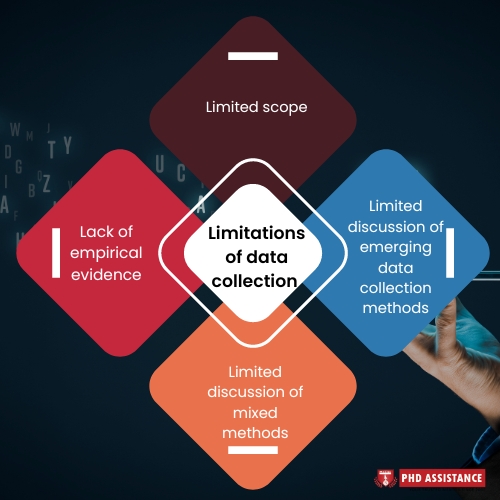Limitations of data collection
Data obtained in numerical form from primary or secondary sources is referred to as quantitative research data collection. This sort of data is employed in mathematical computations and statistical analysis, and it may be used to make real-world data collection in quantitative research results.
Introduction
The paper “How to Choose an Appropriate Research Data Collection Method and Method Choice among Various Research Data Collection Methods and Method Choices during PhD Program in India?” provides a helpful overview of various data collection methods and offers guidance on how to choose the appropriate method for a given research question. However, there are several limitations of the paper, including:
- Limited scope: The paper focuses specifically on research methods in the context of PhD programs in India, which may limit its generalizability to other contexts and disciplines.
- Lack of empirical evidence: The paper does not provide empirical evidence to support the recommendations made. While the authors draw on their own experience and expertise, there is a need for further primary data and secondary data collection in research to validate the recommendations and assess their effectiveness.
- Limited discussion of mixed methods: The paper does not provide a comprehensive discussion of mixed methods research, which involves combining different data collection methods in a single study. This is an important area of research that could be further explored.
- Limited discussion of emerging data collection methods: The paper does not provide an in-depth discussion of emerging data collection methods, such as social media data analysis, big data analytics, and wearable technology. These methods are becoming increasingly important in research and should be considered when choosing a data collection method.

Overall, while the paper provides valuable guidance on how to choose an appropriate data collection method, there is a need for further research to explore the limitations and strengths of different methods and to identify the most effective methods for different research questions and contexts.
The main disadvantage of surveys is their lack of flexibility, as one questionnaire must be used for all respondents throughout the investigation. On the other hand, observation-based studies strongly rely on the researcher’s perspective of a scenario, and there is no system to assess the data’s veracity. Finally, document evaluations are unidimensional, meaning all decisions must be made based on the limited information in the research papers. As a result, a researcher must carefully evaluate the approach that is best suited for their research based on the study’s goal and the resources available.
PhD Assistance
PhD. Assistance is well aware that data collecting is a critical phase in doing research and can significantly impact the results or conclusion. Our global staff of PhD experts assists you in data collecting based on the study topic and data source. PhD experts have taught our data-gathering employees from across the world, and their tacit and explicit expertise has enabled them to gather any survey (personal interview, mail, in-house), focus groups, etc. and translate it into a more accessible format, therefore assisting in decision-making.
References
Politano, P. M., Walton, R. O., & Roberts, D. L. (2017). Introduction to the Process of Research: Methodology Consideration. Charleston, South Carolina, USA: Hang Time Publishing, Ltd. Co
 Previous Post
Previous Post Next Post
Next Post
